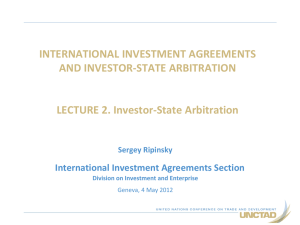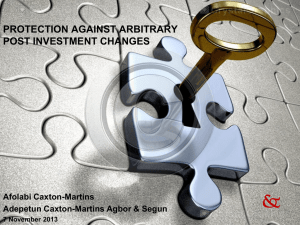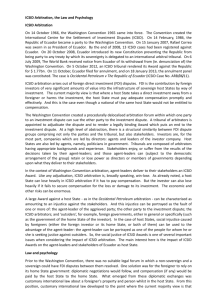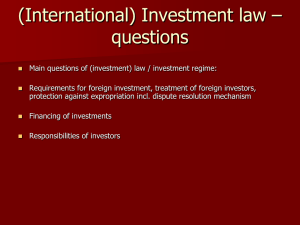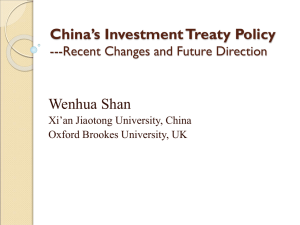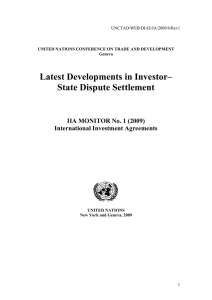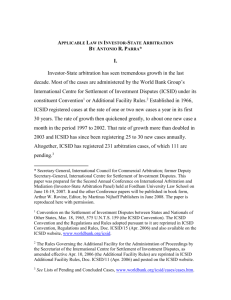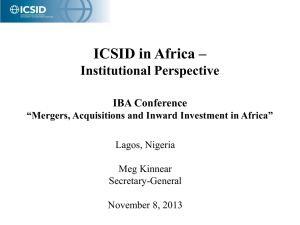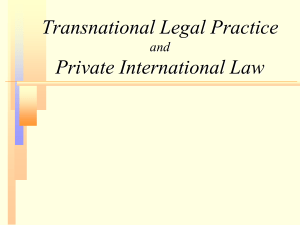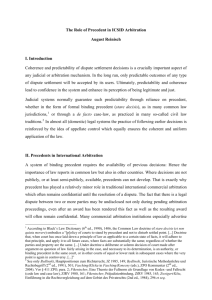ICSID and SADC: Investor-State Dispute Settlement
advertisement
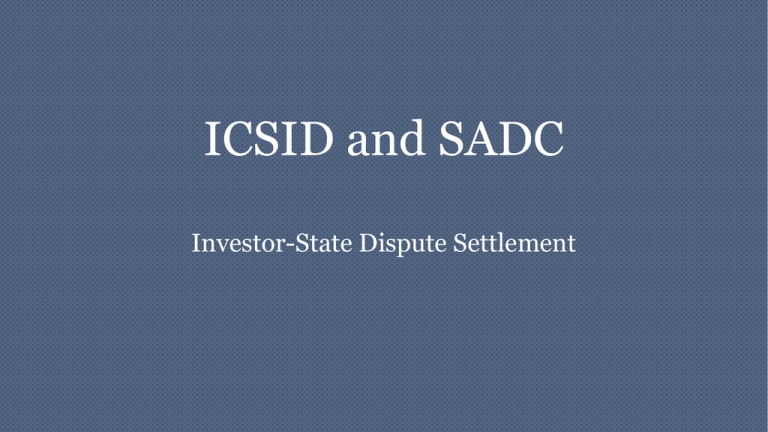
ICSID and SADC Investor-State Dispute Settlement Investor-State Dispute Settlement (ISDS) • ISDS mechanisms grant foreign investors the right to initiate dispute settlement proceedings directly against a foreign government (the "Host State") rather than suing the Host State in that State’s courts • “Arbitration without privity” • ISDS rights arise from provisions of certain bilateral investment treaties “BITs”), international trade treaties, such as NAFTA’s Chapter 11, and international investment agreements, such as the Energy Charter Treaty • ISDS takes place under the auspices of international arbitral tribunals such as the LCIA, the ICC, the Stockholm C of C, or UNCITRAL Arbitration Rules, but it most often is associated with arbitration under the rules of the International Centre for Settlement of Investment Disputes, commonly referred to as the ICSID Investor-State Dispute Settlement (ISDS) • The U.S. enabling legislation for the ICSID Convention, 22 U.S.C. §1650a • A benefit of the Washington Convention is that it is even more favorable to recognition and enforcement of awards than the New York Convention as there are no grounds under the Washington Convention for national courts to refuse recognition and enforcement of ICSID tribunal awards The Convention on the Settlement of Investment Disputes between States and Nationals of Other States • African Members Algeria Benin Botswana Burkina Faso Burundi Cabo Verde Central African Republic Chad Congo, Democratic Rep. of Congo, Rep. of Egypt, Arab Rep. of Ethiopia Gabon Ghana Guinea Guinea-Bissau Lesotho Liberia Madagascar Mali Mauritania Mauritius Mozambique Namibia Niger Rwanda Sao Tome and Principe Seychelles Sierra Leone Somalia Sudan Swaziland Tanzania Tunisia Uganda Zambia Brunei Darussalam Cameroon Comoros Côte d’Ivoire Gambia, The Kenya Malawi Morocco Nigeria Senegal South Sudan Togo Zimbabwe ICSID Procedures for the Settlement of Disputes Between an Investor and Host State • Notice • Cooling-off periods, 3 to 6 months (Parties often take this time to negotiate the dispute) • File arbitration • Jurisdictional stage ICSID Procedures • Request For Arbitration • First Session of the Tribunal • • • • • Governing substantive law and procedural rules Location of proceedings – (counsel, parties, witnesses, arbitrators) Language of written and oral proceedings Deadlines for the written procedure - Memorial, Counter-Memorial, Reply, Rejoinder Witness Statements and Expert Reports and Discovery • Bifurcation of Proceedings: Jurisdiction and Merits • Written Pleadings: Post-hearing briefs • Pre-Hearing Conference • • • • Order and presentation of proof; examination of witnesses Allocations of time for presentations Submission of rebuttal evidence Post-hearing briefing (including fee petitions) • Oral Hearing ICSID - Statistics • As of March 28, 2012: • 233 cases concluded • 142 cases pending • Arbitrators: • 70% of the arbitrators from Western Europe and North America • 2% from Sub-Saharan Africa • Host State Defendants: • 1% of cases involved Western European states • >20% of all cases African State Respondents ICSID - Statistics Based on UN review of nearly 200 concluded investment treaty arbitrations: • Award decided in favor of State – approximately 40% • Award decided in favor of Investor – approximately 30% • Settlement rate – approximately 30% ICSID – More Data ICSID Proceedings Among ICSID Signatories Egypt - 16 The Democratic Republic of Congo - 9 Congo Republic, Gabon, Guinea and Tanzania - 4 Algeria, Cameroon, Central African Republic, Liberia, Morocco, and Zimbabwe - 3 • Burundi, Gambia, Ghana, Ivory Coast, Madagascar, Niger, Nigeria, Senegal, Togo, and Tunisia - 2 • Burkina Faso, Kenya, Mali, Rwanda, and The Seychelles - 1 • • • • Proceedings against Non-Contracting States under the ICSID Additional Facility Rules Among Non-ICSID Signatories • South Africa - 1 arbitration • Equatorial Guinea – 1 arbitration and 1 conciliation A Few Arbitral Results Involving African State Respondents Benvenuti & Bonfant v. People's Republic of the Congo ICSID Case No. ARB/77/2 (Aug. 8, 1980) Tribunal de grande instance, Paris, Decision of Dec. 23, 1980, 1982 Rev. Arb. 205 Tribunal de grande instance, Paris, Decision of Jan. 13, 1981, 1982 Rev. Arb. 206 Cour d'appel, Paris, Decision of June 26, 1981, 1982 Rev. Arb. 207 and English translation in 20 I.L.M. 878 (1981) • In is dispute, the Congolese authorities nationalized a joint venture bottling facility by militarily occupying the facility and imprisoning the venture’s employees • This case was only the second ICSID award to be reviewed in a national court • The saga in the French courts ultimately confirmed the benefits that the Convention offers investors as it obliges each contracting state to recognize an ICSID award Am. Mfg. & Trading Inc. v. Zaire ICSID Case No. ARB/93/1 (Feb. 10, 1997) • In this dispute, AMT claimed that Zaire violated its obligations under the U.S.Zaire BIT by failing to protect and maintain the security of its investment and by failing to make restitution or pay compensation when Zairean soldiers broke into its industrial complex and damaged and stole goods owned by its 94% owned entity • The Tribunal rejected Zaire’s argument that the ICSID did not have jurisdiction because the dispute was between a local Zairean company and Zaire, concluding that AMT had a right to compel arbitration on its own behalf because it owned 94% of the local company and that, because the local entity was majority-owned by U.S. citizens, it had standing to utilize the ICSID • It awarded US$9 million in compensation plus interest and costs • This was the first award ever given under a bilateral investment treaty to which the United States was a contracting party M. Meerapfel Söhne AG v. Central African Republic ICSID Case No. ARB/07/10 (May 12, 2011) • The Tribunal was comprised of arbitrators from Morocco, Gabon, and Belgium, and the Moroccan national was President of the Tribunal - Azzedine Kettani (Chair), François T’Kint, Judge, Marie-Madeleine Mborantsuo • Swiss Claimant company was the majority shareholder in a joint venture tobaccofarming business in the Central African Republic, with CAR minority shareholders • When the venture suffered various problems, it filed a local lawsuit, but later entered into a Protocol of Agreement with the CAR which contained an ICSID arbitration clause • The assets of the venture were later requisitioned to recover tax debts, and the CAR repudiated the Protocol of Agreement • In the ICSID arbitration, the Claimant alleged that the CAR had expropriated its investment without compensation in violation of the Protocol of Agreement • The Tribunal concluded that the CAR had indirectly expropriated Claimant’s investment and awarded damages in the value of the tobacco harvest actually lost to the CAR’s expropriation by determining the average price of tobacco on the date of expropriation but declined to award the Claimants lost profits and other expenses or moral damages Antoine Goetz & Consorts et S.A. Affinage des Metaux v. Republique du Burundi, ICSID Case No. ARB/95/3 (Feb. 10, 1999); 6 ICSID Rep. 5 (2004); ICSID Case No. ARB/01/2 (June 21, 2012) • Goetz v. Burundi involved a claim filed in 1995 that the revocation of a free zone concession, which granted certain incentives and exceptions to a mineral mining enterprise constituted an indirect expropriation under the Belgium and Luxemburg Union-Burundi BIT • The Tribunal ruled against Burundi, concluding that “the revocation of their FTZ license forced [the complainants] to stop all activity . . . thereby making their investment completely useless and depriving them of the benefits they could expect therefrom” • Tribunal allowed Burundi’s counterclaim and offered nonpecuniary remedy, i.e., reinstatement of the free zone regime Biwater Gauff (Tanz.) Ltd. v. United Republic of Tanzania ICSID Case No. ARB/05/22 (Jul. 24, 2008) • An Anglo-German consortium filed a claim against the Republic of Tanzania under the UK-Tanzania BIT concerning a concession to operate the water and sewerage services of Tanzania's capital, Dar es Salaam • The Tribunal's majority ruled that, while Tanzania's actions may have constituted prima facie violations of certain BIT provisions, they did not cause injury to the claimant's venture, and, accordingly, the claimant was not entitled to compensation • However, the finding of non-compensable fault on the part of Tanzania allowed the Tribunal to allocate the costs of the proceeding equally • The Award has been described as a “model of reasoning and exhaustive analysis,” and it provides a flexible definition of "investment" under the ICSID Convention • It also offers clarity on a number of legal standards such as fair and equitable treatment • The Tribunal also served to legitimize amicus submissions Bernardus Henricus Funnekotter and Others v. Republic of Zimbabwe, ICSID Case No. ARB/05/6 (April 22, 2009) • This ICSID claim was brought in 2005 by a group of 13 Dutch farmers who alleged that Zimbabwe had breached various provisions of the NetherlandsZimbabwe BIT by expropriating their agricultural landholdings and other property as part of Mugabe’s land-reform program • In its defense, Zimbabwe noted that its actions were justified in the public interest to address entrenched historical inequalities in land-ownership in Zimbabwe • Zimbabwe also argued that large-scale nationalizations called for a discounted rate of compensation, although this was dismissed by the Tribunal, which determined that the value of an investment should be considered independently “of the number and aim of the expropriations” • In April 2009, the Tribunal ordered Zimbabwe to pay the claimants approximately 8.2 million Euros in damages and US $225,000 in arbitral costs Southern African Development Community (SADC) • SADC’s primary objective is “to promote sustainable and equitable economic growth and socio-economic development through efficient productive systems, deeper co-operation and integration, good governance, and durable peace and security, so that the region emerges as a competitive and effective player in international relations and the world economy” • 15 Member States: Angola, Botswana, Democratic Republic of the Congo, Lesotho, Madagascar, Malawi, Mauritius, Mozambique, Namibia, Seychelles, South Africa, Swaziland, Tanzania, Zambia, Zimbabwe Southern African Development Community (SADC) • The SADC Protocol on Finance and Investment (the "Protocol"), which entered into force on April 16, 2010, contains international protections for foreign investors in the SADC, including the ability to initiate binding international arbitration proceedings directly against Member States • While Article 28(2) sets forth three options for investor state-arbitration the SADC Tribunal, the ICSID or the ICSID Additional Facility, or the UNCITRAL Rules – the SADC Tribunal’s jurisdiction has been restricted to disputes between Member States, so the choices now are limited to the ICSID options and UNCITRAL • Further, Article 28 allows parties that resist arbitration to effectively limit a party’s choice of forum to arbitration under the UNCITRAL Rules Southern Africa Development Community (SADC) SADC Model BIT • Exceptions for measures relating to public morals and safety, the protection of human, animal or plant life or health, the conservation of natural resources, environmental protection, prudential and taxation measures, as well as for existing non-conforming measures and ‘excluded sectors’, and omitting MFN • Recommendations for various investor obligations, an article confirming a host state’s right to regulate in the public interest, and a provision on ‘fair administrative treatment’ rather than the ‘fair and equitable treatment’ provision • Recommendation for ‘fair and adequate’ compensation in cases of legitimate expropriation, rather than ‘prompt, adequate and effective’ • Recommendation that foreign investors be denied recourse to international investor-state dispute settlement procedures, or, if such recourse is included, qualifying it by requiring that investors first exhaust local remedies System Under Scrutiny • The legitimacy of investment agreement arbitration has increasingly come under scrutiny • Bolivia, Ecuador, and Venezuela have publicly denounced the ICSID Convention, a formal legal withdrawal pursuant to its Article 71 • A frequent unsuccessful respondent in ICSID proceedings, Argentina also has indicated that it may withdraw from the Convention • Australia recently decided to exclude provisions on international arbitration in its future investment agreements • India’s Department for Industrial Policy and Promotion has called for a review of all of the BITs that India has signed • Indonesia too has indicated that it may let its ISDS legal obligations lapse A System Under Scrutiny • South Africa, although not an signatory of the Washington Convention, launched a review of its BITs following a claim against it under the ICSID Additional Facility Rules in Piero Foresti v. Republic of South Africa • Investors from Luxembourg and Italy argued that South Africa's Mining and Petroleum Resources Development Act violated the fair and equitable treatment and the national treatment provisions of South Africa’s BIT with Belgium and Luxembourg and expropriated their mineral rights by treating foreign investors and investments less favorably than investments with Historically Disadvantaged South Africans • The claim was settled in 2010, but South Africa immediately began its BIT review • Draft Promotion and Protection of Investment Bill and Model BIT Websites • https://icsid.worldbank.org/ICSID/Index.jsp • http://www.sadc.int/ • http://unctad.org/SearchCenter/Pages/Results.aspx?k =isds
